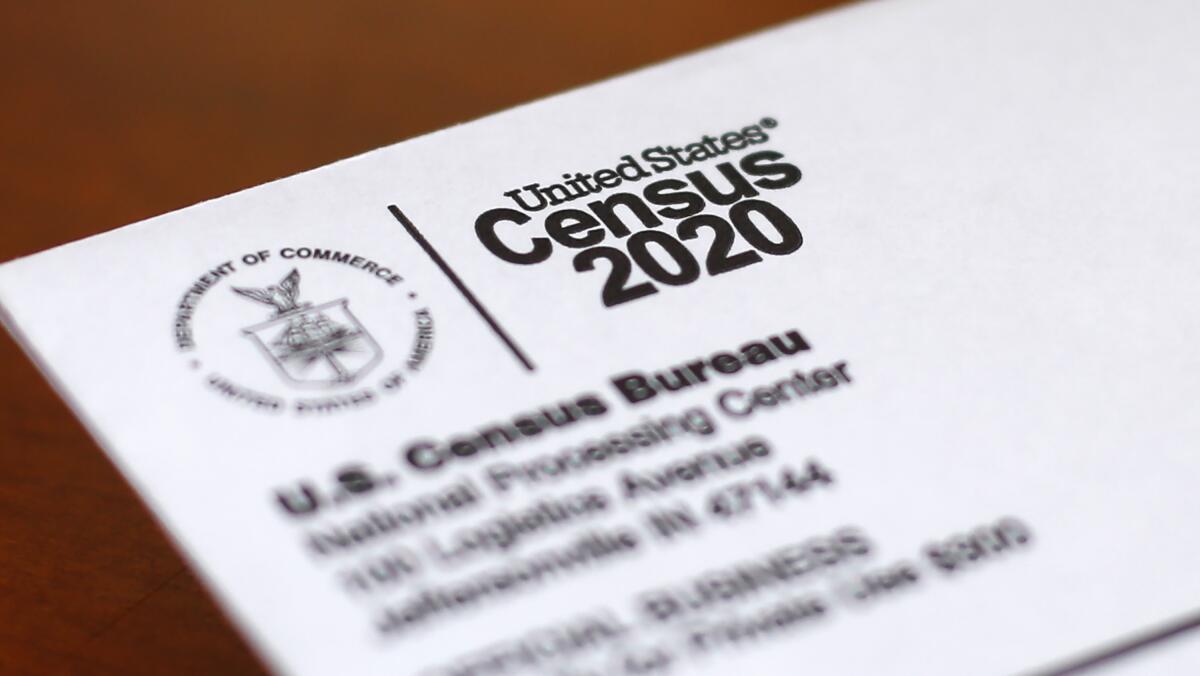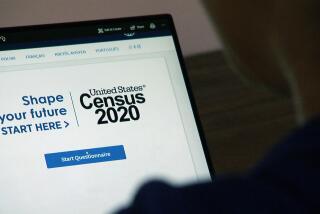Former Census Bureau directors tell Congress extra time is vital for an accurate 2020 count

- Share via
WASHINGTON — Completing an accurate count in the 2020 census is in doubt as the government grapples with the coronavirus pandemic and attempts by President Trump to exclude residents who are in the country illegally, four former Census Bureau directors told Congress on Wednesday.
“The chances of having a census accurate enough to use is unclear — very, very much unclear,” said Kenneth Prewitt, who was director from 1998 to 2001.
A count of all persons living in the United States is mandated every 10 years by the Constitution. The resulting statistical information is the bedrock of public policy and business decisions for the next decade, used to redraw congressional districts and allocate government funding.
At a House Oversight and Reform Committee hearing, Steven Dillingham, the bureau’s current director, said the agency is racing to finish the count by Dec. 31, the deadline set under federal law.
In April, Commerce Secretary Wilbur Ross, who oversees the bureau, asked Congress to give it four extra months to finish the count, noting that the COVID-19 outbreak had delayed much of its outreach, including the scheduled knocking on millions of doors to gather information about people who have not already responded.
The Democrat-led House passed legislation to allow the additional time, but the Republican-led Senate has not followed, and the administration appears to have withdrawn its request for additional time.
“I’m not involved directly with the Hill negotiations on revising the schedule,” Dillingham told representatives.
About 63% of U.S. homes have responded to the census so far, and door-knocking by census takers that was supposed to start in April is only now beginning — just as COVID-19 cases are rising in many states.
Without the extra time to follow up in person with households that don’t respond and to visit homeless camps, rural areas and other traditionally hard-to-contact communities, people won’t be counted, lowering the federal and state funds tied to their regions’ populations and lessening their political representation, the former Census directors told lawmakers.
“Not extending those deadlines is going to put tremendous pressure on the Census Bureau. It’s not clear what kind of quality counts they can produce if they don’t get the extension,” said John H. Thompson, who was director from 2013 to 2017.
Adding to the pressure is a memo from Trump last week ordering his administration to exclude immigrants who are in the country illegally when calculating how many seats in Congress each state gets after the current census.
The census questionnaire does not ask about citizenship or legal status. The Supreme Court last year rejected an attempt by the administration to include a citizenship question, which critics said was an effort to suppress responses from Latinos and lower the count in states like California that are heavily Democratic and have large immigrant populations.
There has been broad speculation about whether Trump’s directive is constitutional, and if so, how the bureau could comply. At least four lawsuits have been filed over the memo, including one by California Atty. Gen. Xavier Becerra on Tuesday.
Dillingham said the bureau was researching whether it could use data collected by other federal agencies and states to estimate the total number of noncitizen immigrants in an area. He said the agency was not consulted about the memo in advance, and he learned in a news report that Trump was going to issue it.
Several of the former census directors raised concerns about using such an untested process to modify the results.
“The Census Bureau does not know how to do what the president is asking them to do, and it’s going to hurt the census,” Prewitt said.
Noting that the bureau sometimes uses outside records to supplement the official count when people don’t respond to the census, Rep. Chip Roy (R-Texas) asked why the bureau could not do the same thing to subtract people.
“This is a reality of what our Census Bureau does in order to achieve numbers,” Roy said.
Prewitt said supplementation is used as rarely as possible, and like other ways the bureau gathers information, it is based on statistical principles and tested in small populations over months or years before being put into place.
Committee Chairwoman Carolyn B. Maloney (D-N.Y.) said she was worried that the president is pressuring the bureau to finish by the end of December so that if he loses the election in November, he will have time before leaving office on Jan. 20 to certify the results and inform states about their new seat-apportionment figures in Congress. Decertifying census results would be difficult and unprecedented.
“I am concerned that the administration is seeking to rush the process and sacrifice the accuracy of the census for political gain — that the president’s intent is to have all of this done before he leaves office,” Maloney said.
Nearly 37% of the country’s households have not yet responded to the census, according to bureau figures.
Self-response rates vary significantly among the states, and from county to county. For example, about 64% of Californians have responded to the census at this point, compared with 49% in Alaska and 27% in Puerto Rico.
Within California, fewer than 30% of households in Alpine, Mono and Trinity counties have responded. Under 50% of households have responded in many counties along the state border with Nevada.
More to Read
Get the L.A. Times Politics newsletter
Deeply reported insights into legislation, politics and policy from Sacramento, Washington and beyond. In your inbox twice per week.
You may occasionally receive promotional content from the Los Angeles Times.











